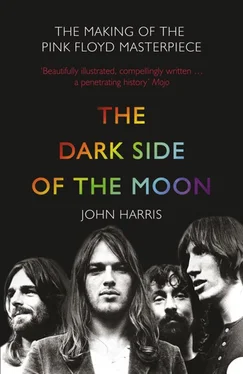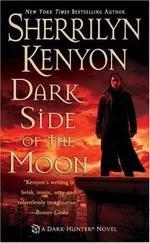The week that Waters arrived at Compass Point, David Gilmour – long known to his friends and associates as Dave, before insisting on his full Christian name at some point during the 1990s – was at his home in Sussex, apparently embroiled in distanced negotiations with his old friend and colleague. ‘We’re in secondhand contact,’ he explained. ‘James Guthrie, our engineer, is remixing the album. Roger listens to it and I listen to it, and we both give our comments and have our little battles over how we think it should be through someone else. I’ve just had no contact with Roger since ‘87 or something. He doesn’t seem to want any. And that’s fine.’
Gilmour responded to questions about The Dark Side of the Moon with his customary reserve, couching a great deal of what he said in a businesslike kind of modesty. The record might have been elevated into the company of the nine or ten albums that go some way to defining what rock music is (or perhaps used to be): Highway 61 Revisited, Revolver, Pet Sounds, The Band, Led Zeppelin IV, et al . It undoubtedly continued to send thousands of listeners into absolute raptures. Yet at times, Gilmour still sounded surprised by what had happened. When asked about his memory of first appreciating the album in its entirety, he said this: ‘I don’t think any of us were in any doubt that we were moving in the right direction, and what we were getting to was something brilliant – and it was going to be more critically and commercially successful than anything we’d done before … I knew that we were moving up a gear, but no one can anticipate the sales and chart longevity of that nature.’
Every now and again, he could allow himself a laugh at the kind of absurdity that comes with such vast success. There was a gorgeous irony, for example, in the fact that Roger Waters had intended Dark Side ’s lyrics to be unmistakably direct and simple, only to see all kinds of erroneous interpretations heaped on them – not least the absurd theory, circulated in the mid-1990s, that Dark Side had been created as a secret soundtrack to The Wizard of Oz . ‘I think Roger had got sick of people reading everything wrongly,’ said Gilmour. ‘He was always talking about demystifying ourselves in those days. And The Dark Side of the Moon was meant to do that. It was meant to be simple and direct. And when the letters started pouring in saying, “This means this, and this means that,” it was “Oh God.” But as the years go by, you realize that you’re stuck with it. And thirty years later you get The Wizard of Oz coming along to stun you. Someone once showed me how that worked, or didn’t work. How did I feel? Weary .’
As had become all but obligatory in his interviews, Gilmour also reflected on the creative chemistry that had once defined his relationship with Waters and fired the creation of Pink Floyd’s best music. ‘What we miss of Roger,’ he said in 1994, ‘is his drive, his focus, his lyrical brilliance – many things. But I don’t think any of us would say that music was one of the main ones … he’s not a great musician.’ Nine years on, he was sticking to much the same script: ‘I had a much better sense of musicality than he did. I could certainly sing in tune much better [laughs]. So it did work very well.’
Over in the Bahamas, Roger Waters had angrily pre-empted any such idea. ‘That’s crap ,’ he said. ‘There’s no question that Dave needs a vehicle to bring out the best of his guitar playing. And he is a great guitar player. But the idea, which he’s tried to propagate over the years, that he’s somehow more musical than I am, is absolute fucking nonsense. It’s an absurd notion, but people seem quite happy to believe it.’
All that apart, and presumably to Waters’s continuing annoyance, Gilmour was still the effective custodian of the Pink Floyd brand name. His last performance under that banner had taken place on 29 October 1994, in the echo-laden surroundings of Earls Court arena; poetically – and in brazen denial of its chief architect’s continued absence – the show had been built around a rendition of The Dark Side of the Moon . Now, when asked about the prospects of any further Pink Floyd records or performances, he sounded jadedly noncommittal. ‘At the moment, it’s something so far down my list of priorities that I don’t really think about it. I don’t have a good answer for you on that. I would rather do an album myself at some point, and get on with other things for the time being. Would I rule it out? Mmmm . Not a hundred per cent. One never knows when one’s vanity is going to take one.’
In June 2005, there came news so unlikely as to seem downright surreal. After a period of estrangement lasting two decades, Roger Waters and David Gilmour announced that they would both participate in a Pink Floyd reunion at the London Live 8 concert. ‘Like most people, I want to do everything I can to persuade the G8 leaders to make huge commitments to the relief of poverty and increased aid to the third world,’ read a statement issued by Gilmour. ‘Any squabbles Roger and the band have had in the past are so petty in this context, and if re-forming for this concert will help focus attention then it’s got to be worthwhile.’
Waters, meanwhile, issued a communiqué that sounded a slightly more gonzo note than his reputation as one of rock music’s intellectual sophisticates might have suggested. ‘It’s great to be asked to help Bob [Geldof] raise public awareness on the issues of third world debt and poverty,’ he said. ‘The cynics will scoff – screw ’em! Also, to be given the opportunity to put the band back together, even if it’s only for a few numbers, is a big bonus.’ His return, however temporary, seemed to provide retrospective confirmation that the Pink Floyd who had authored A Momentary Lapse of Reason and The Division Bell had not been the genuine article, though the Gilmour statement came with a slightly different spin: ‘Roger Waters will join Pink Floyd to perform at Live 8’ ran the headline on the official Pink Floyd website.
The group’s performance at Hyde Park – ‘Breathe/Breathe Reprise’, ‘Money’, ‘Wish You Were Here’ and ‘Comfortably Numb’, delivered with a poise and understatement that only served to enhance the music’s impact – sent interest in the Floyd’s music sky-rocketing; according to the Independent , the day after Live 8 found sales of the career anthology Echoes rising by 1,343%. Talk of a lasting rapprochement, however, was quickly squashed (for all the show’s wonders, Gilmour said the experience was as awkward as ‘sleeping with your ex-wife’). For the time being, their creative history thus remains sealed, long since hardened by hindsight into a picture of peaks, troughs and qualified successes.
To take a few example at random, 1967’s The Piper at the Gates of Dawn is fondly loved by a devoted fan-cult, and couched in the semi-tragic terms of an artistic adventure that was ended far too soon. Ummagumma (1969) is treasured by only hardened disciples; Wish You Were Here often seems as worshipped as The Dark Side of the Moon. Animals and Meddle (1971) are the kind of records that those who position themselves a little higher than the average record-buyer habitually claim to be underrated and overlooked – and when The Wall enters any discussion, its champions often shout so passionately that any opposing view is all but drowned out.
By way of underlining Waters’s view of their history, the two albums that Gilmour piloted in his absence are rarely mentioned these days. The accepted view of their merits is that they represented ‘Floyd-lite’, an invention that worked very well as a means of announcing mega-grossing world tours, but hardly stood up to the band’s best work. That said, the idea that most of Pink Floyd’s brilliance chiefly resided in the mind of Roger Waters has been rather offset by the underwhelming solo career that began with 1984’s The Pros and Cons of Hitch Hiking – proof, despite the occasional glimmer of brilliance, that he too is destined to toil in the slipstream of the music he created in the 1970s.
Читать дальше












